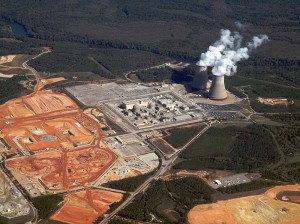New Partnership to Monitor Nuclear Radiation in Georgia for Three Years
 (APN) ATLANTA — A new partnership called the Georgia Radionuclide Education, Monitoring, and Outreach Project (REMOP) will monitor nuclear radioactive pollution in Georgia’s air, land, and water for the next three years, while engaging citizens in Burke County and other affected communities to be involved in the monitoring process.
(APN) ATLANTA — A new partnership called the Georgia Radionuclide Education, Monitoring, and Outreach Project (REMOP) will monitor nuclear radioactive pollution in Georgia’s air, land, and water for the next three years, while engaging citizens in Burke County and other affected communities to be involved in the monitoring process.
Georgia Women’s Action for New Directions (WAND) announced in a mass email on Thursday, May 19, 2016, that they had negotiated the program in partnership with the University of Georgia’s Savannah River Ecology Lab; and that it will be funded by the U.S. Department of Energy (DOE) Savannah River Site.
“REMOP… is a data-informed, public outreach, engagement, and education program that will serve local communities in eastern Georgia, mainly the Shell Bluff community, living in the shadow of the nuclear weapons and energy industries,” WAND stated.
As previously reported by Atlanta Progressive News, there has been a lack of even monitoring for radioactive pollution in Georgia for several years.
The Georgia Environmental Protection Division (EPD) had previously been providing independent monitoring; however, that ceased in 2003.
Thus, even though some doses of radioactive pollution were estimated during the Environmental Impact Statement, there is no official data on whether the actual pollution is consistent with those purportedly “safe” estimates.
Meanwhile, however, some statistical analyses have shown a disturbing correlation between higher rates of cancer and other diseases, and with living near a nuclear plant.
http://atlantaprogressivenews.com/2012/01/13/shell-bluff-residents-speak-out-on-nuclear-reactors/
The environmental monitoring analysis will include “a full spectrum of radionuclides, as well as mercury, methyl mercury, and a suite of about 20 metals,” the email stated.
“Monitoring sites will be chosen based on community members’ needs and suggestions,” the email stated.
“The program will outreach to local residents about the sources, levels, and risks of radionuclides and metals in the environment in which they live, and a community education program will be developed based on community surveys and participation and the results of the monitoring analysis,” the email states.
“This program helps overcome the nuclear industry’s general failure to educate the public about radiation and the specter of nuclear disasters,” the email states.
“It demonstrates a genuine willingness for the industry to learn about community members’ needs and concerns, as well as to make more accessible responses about potential sources of radionuclide contamination within the environment. It is hopeful that this program will begin to build trust between people living around, and people working within, the nuclear industry,” the email states.
(END/2016)
EDITOR’S NOTE: WAND sent the above-referenced email to Atlanta Progressive News as part of their general email list, but then requested that we hold this story. It is not consistent with our policy to withhold news from our readers, unless there are extenuating circumstances that would warrant such an extraordinary action. APN’s Editor communicated with WAND’s Executive Director, Becky Rafter, to learn the nature of their request, and to see if there were any such circumstances. Upon learning that there were no such circumstances, we have moved forward, in order to provide our readers with timely and important information in furtherance of our coverage priorities.
The State of Georgia stopped monitoring Tritium in our water AFTER it was found in a well close to the Savannah River Plant. It was easier to stop looking this kind of thing than it would be to try to fix it. Tritium is radio active and it only comes from one place, a nuclear reactor.’